We used the latest data and insights to identify the Highest Paying Immunology Jobs so that you can learn and earn more.
These jobs will help you choose a career that will give you job satisfaction regarding pay and other benefits. You should note that salary depends on your expertise and experience in the field.
We compiled this article using data from the US Bureau of Labor Statistics and other top sources such as recruitment reports and job marketplaces.
Here are the highest-paying immunology jobs.
Similar Articles:
- 10 Highest Paying Teaching Jobs to Consider
- 10 Highest Paying Medical Science Jobs to Consider
- 10 Highest Paying Material Science Jobs to Consider
Table of Contents
#10. Research Assistant
How much do they get paid?
- Source: Glassdoor
- Low Range: $20,000 per year
- High Range: $153,000 per year
- Median Pay: $49,013 per year
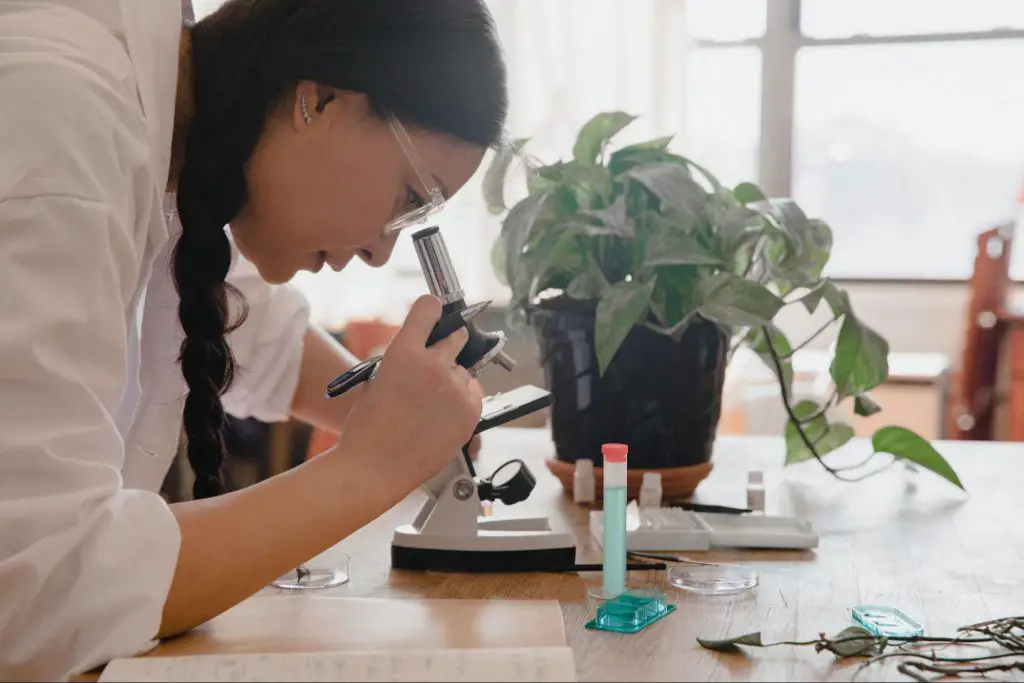
What do you do?
A research assistant is a person who assists with the research and writing of reports, articles, or books. They work closely with a researcher to help them gather data and find relevant information.
What degrees and skills are usually required?
Most research assistants have a bachelor’s degree in biology or a related field. But some employers may prefer to hire someone with a master’s degree in the field.
Who’s hiring for these jobs?
Research assistants work in:
- Universities or colleges.
- Nonprofit organizations.
- Government agencies.
What’s the best way to get this job?
You can get into this field by having at least a bachelor’s degree in a discipline related to the field you want to work in. Consider entry-level jobs to gain working experience. You may consider job boards like Indeed.com for your job search.
How do you become a research assistant?
#9. Lab Assistant
How much do they get paid?
- Source: Salary.com
- Low Range: $33,737 per year
- High Range: $66,104 per year
- Median Pay: $49,935 per year
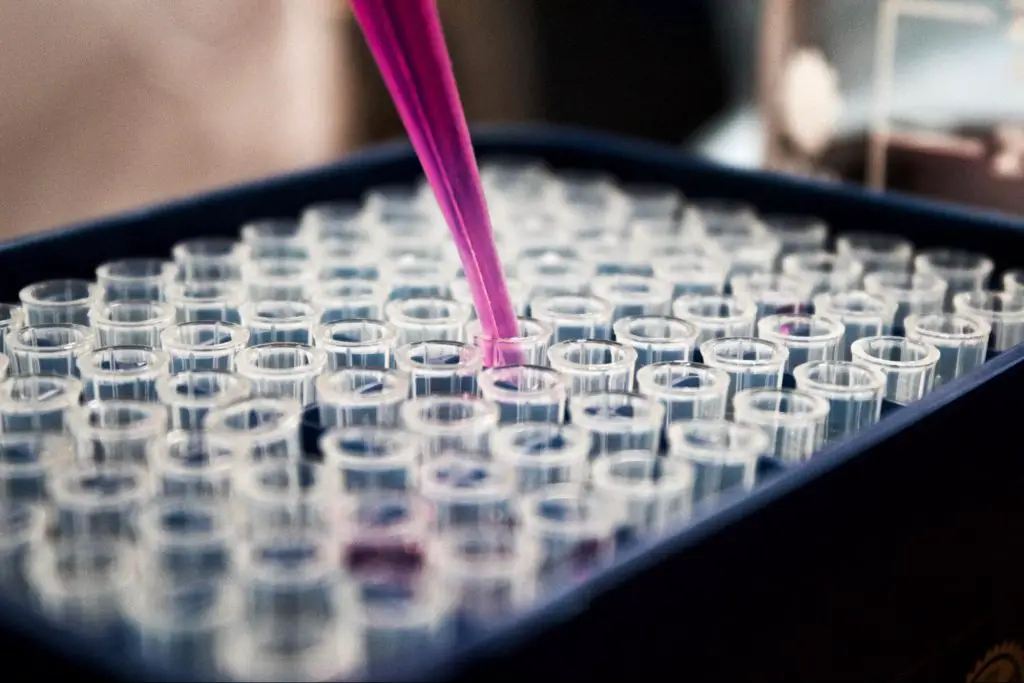
What do they do?
Lab assistants help scientists run tests and conduct experiments on everything from humans to plants to animals. They’re responsible for:
- Keeping track of equipment, supplies, and data.
- Making sure that the equipment is working properly.
- Coordinating with other lab assistants to ensure that all tasks get done on time.
What degrees and skills are usually required?
Lab assistants have a wide range of degrees they can choose from. They may have an undergraduate degree in chemistry or biology. Or a master’s or Ph.D. in laboratory management. These assistants must have the ability to:
- Keep track of time.
- Effectively organize their work.
- Communicate with other people.
Who’s hiring for these jobs?
Laboratory assistants work in laboratories, universities, and hospitals.
The annual average salary for these professionals is $49,935. But the pay depends on your employer and experience.
What’s the best way to get this job?
You can get started in this field with your degree through an internship. Many labs offer internships as part of their regular training programs. This will give you the necessary experience for your job later on.
What’s it like to be a lab assistant?
Similar Articles:
- 10 Highest Paying Math Jobs to Consider
- 10 Highest Paying Multidisciplinary Jobs to Consider
- 10 Highest Paying Sociology Jobs to Consider
#8. Cell Culture Scientist
How much do they get paid?
- Source: Comparably
- Low Range: $45,128 per year
- High Range: $67,692 per year
- Median Pay: $56,410 per year
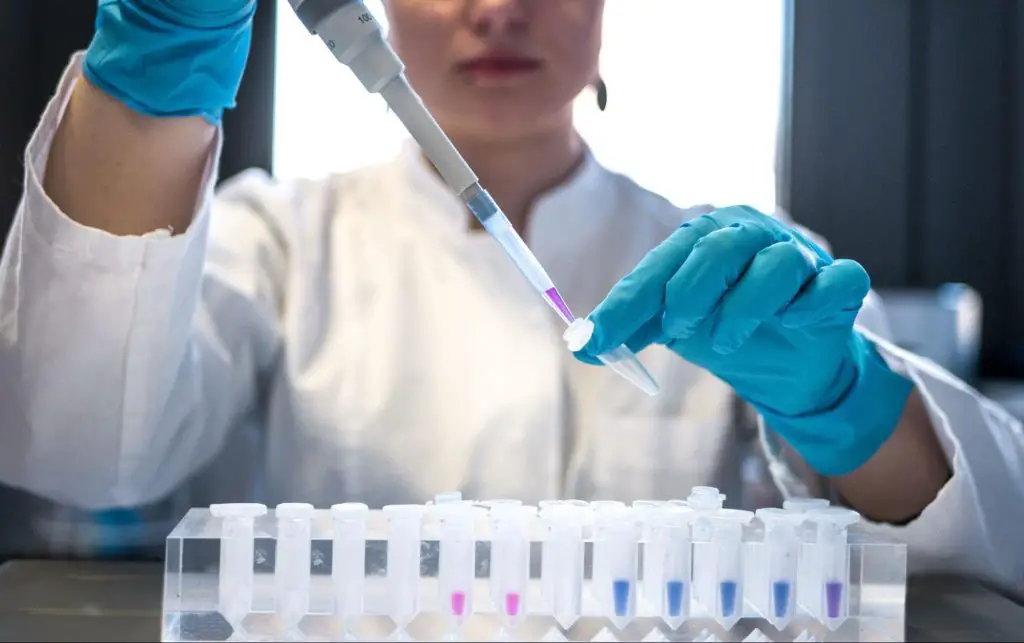
What do they do?
Cell culture scientists are responsible for growing cells in the lab, using various methods to test the effects of different conditions on cell growth.
The role of these molecular biology scientists is to create and maintain cell cultures for laboratory purposes. They’re responsible for ensuring that the cells are healthy and safe for use in experiments.
What degrees and skills are usually required?
To get this job, you’ll need a bachelor’s degree in biology or a related field to get this job. If you want to specialize in cell culture, you may want to consider pursuing an advanced degree.
Who’s hiring for these jobs?
Cell culture scientists work in:
- Research laboratories at colleges, universities, and medical facilities.
- Pharmaceutical companies.
What’s the best way to get this job?
You can become a cell culture scientist by getting a bachelor’s degree in biology or chemistry. With your degree and experience, you may now search jobs you qualify for and apply.
What’s it like to be a cell culture scientist?
#7. Research & Development Specialist
How much do they get paid?
- Source: Comparably
- Low Range: $62,500 per year
- High Range: $83,021 per year
- Median Pay: $63,000 per year
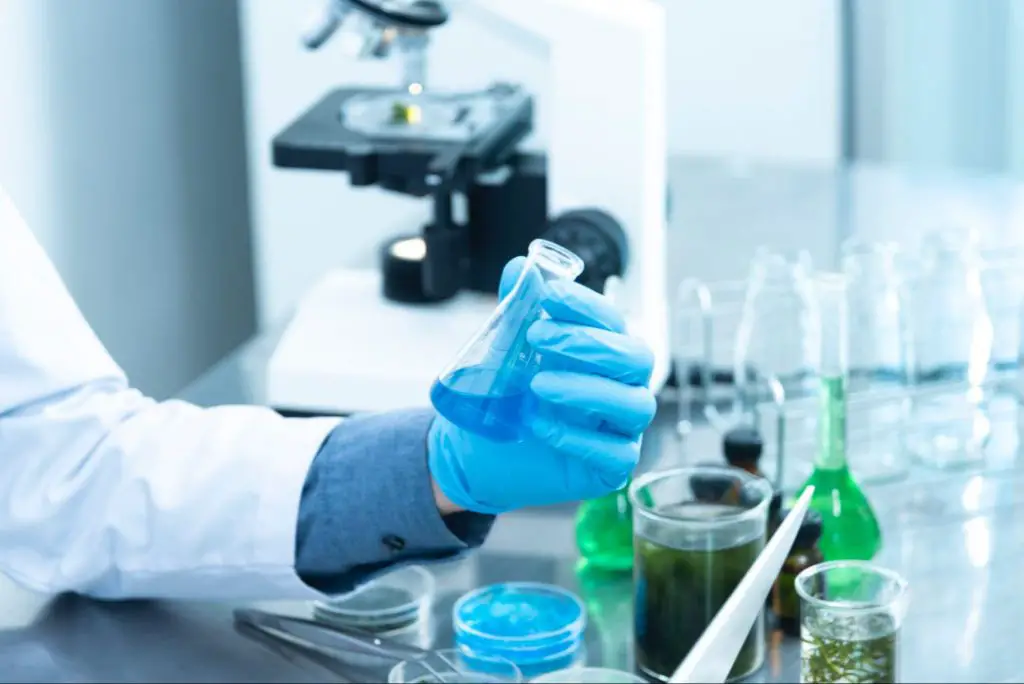
What do they do?
Research & Development Specialist (R&D specialist) conducts research on behalf of their company to develop new products, services, and technologies. They work with teams of scientists and engineers to gather data and conduct experiments. This research often focuses on specific aspects of the developed product or service.
What degrees and skills are usually required?
To become an R&D specialist, you need at least a bachelor’s degree in a relevant field such as chemistry. Besides this degree, you also need to have completed work experience in a laboratory setting. Some employers prefer master’s degree holders for advanced positions.
Who’s hiring for these jobs?
R&D specialists are employed by all kinds of companies, including:
- Pharmaceuticals.
- Technology companies.
- Manufacturing firms.
- Government agencies.
- Non-profit organizations.
What’s the best way to get this job?
To get this job title, you need to focus on your education.
You can start by gaining experience through an internship program or an entry-level position at a company with your degree.
What’s it like to be a research and development specialist?
Similar Articles:
- 10 Highest Paying Pharmaceutical Jobs to Consider
- 10 Highest Paying Neuroscience Jobs to Consider
- 10 Highest Paying Gerontology Jobs to Consider
#6. Protein Biochemist
How much do they get paid?
- Source: Payscale
- Low Range: $46,000 per year
- High Range: $102,000 per year
- Median Pay: $66,000 per year
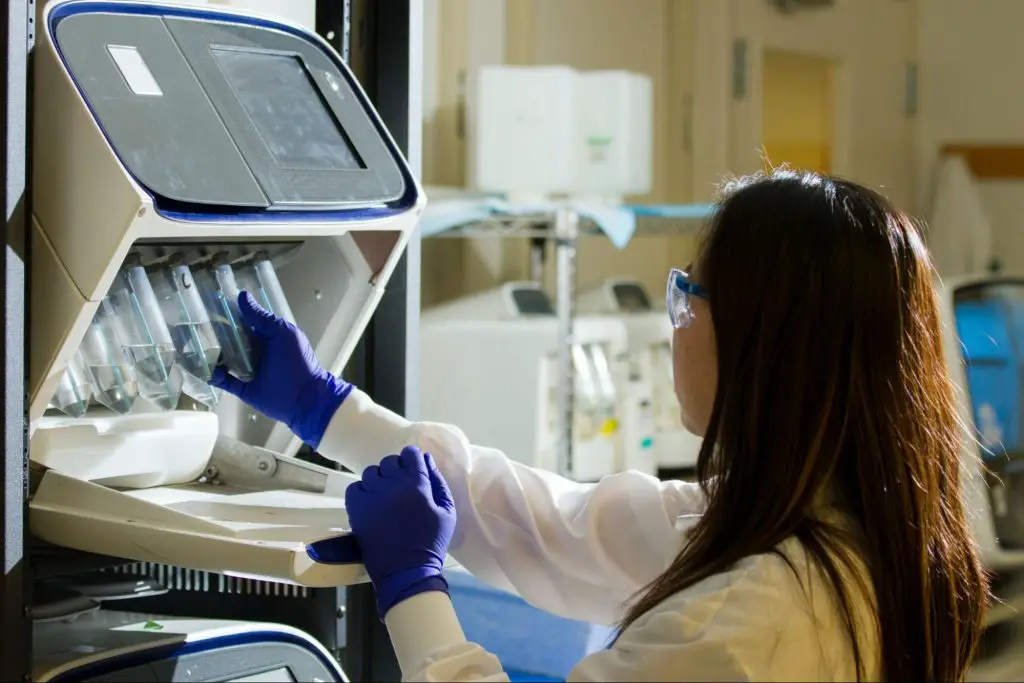
What do they do?
Protein biochemists are scientists who study the structure and function of proteins. They study how proteins are made and how they function in the body.
What degrees and skills are usually required?
A protein biochemist has at least a bachelor’s degree in biochemistry or biology. But most people go on to get their PhDs as well. You should consider developing skills in lab work and possess excellent communication skills.
Who’s hiring for these jobs?
These scientists work for:
- Pharmaceutical companies.
- Research institutions.
- Universities.
What’s the best way to get this job?
The quickest way to get this job is by going to school and getting your degree in biochemistry or biology. Then specialize in protein biochemistry by enrolling for an advanced degree. You’ll be ready for entry-level positions in the job market.
What’s it like to be a protein biochemist?
#5. Medical Technologist
How much do they get paid?
- Source: Salary.com
- Low Range: $62,041 per year
- High Range: $84,892 per year
- Median Pay: $72,680 per year
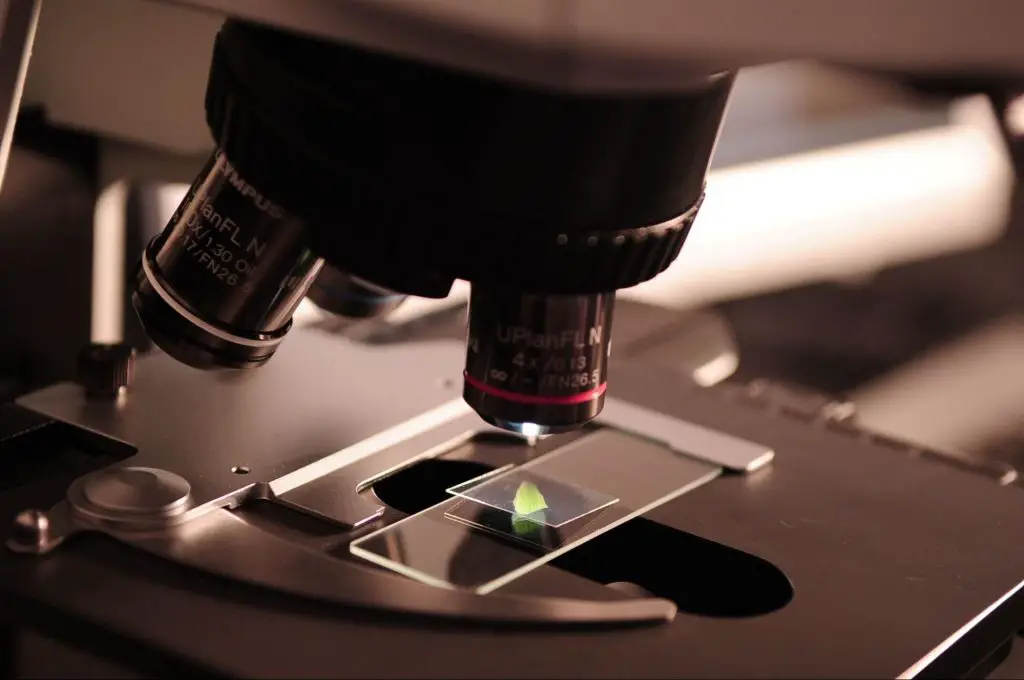
What do they do?
Medical technologists are the people who keep hospitals running. They’re basically like the mechanics of the medical world. These medical professionals help doctors ensure that patients get the best care possible.
What degrees and skills are usually required?
To become a medical technologist, you must have an associate’s degree in medical technology or another related field. You’ll also need to pass an exam from an accredited agency like the American Society of Clinical Pathology (ASCP) or the National Credentialing Agency for Laboratory Personnel (NACLPI).
Besides passing an exam, medical technologists must also take continuing education courses throughout their careers to keep up with advances in technology.
Who’s hiring for these jobs?
Medical technologists work in hospitals, clinics, research labs, and other locations where healthcare is provided.
What’s the best way to get this job?
You can get a medical technologist’s job through networking with people who work within this field with your degree. Or you can apply online for advertised openings within your local area.
What’s it like to be a medical technologist?
Similar Articles:
- 10 Highest Paying Astronomy Jobs to Consider
- 10 Highest Paying Psychology Jobs to Consider
- 10 Highest Paying Physics Jobs to Consider
#4. Bioanalytical Scientist
How much do they get paid?
- Source: ZipRecruiter
- Low Range: $51,000 per year
- High Range: $106,000 per year
- Median Pay: $76,986 per year

What do they do?
Bioanalytical scientists are the people who analyze the chemical composition of biological samples in labs. They often work with complex machines and instruments to determine what’s happening inside your body. These scientists may also provide information to help doctors diagnose diseases like cancer.
What degrees and skills are usually required?
A degree in chemistry or biology is ideal for this career. But any degree in science will do if you have experience working with analytical chemistry.
Who’s hiring for these jobs?
The top employers for bioanalytical scientists are hospitals, pharmaceutical companies, and research labs.
What’s the best way to get this job?
This job needs a bachelor’s degree at a minimum, but having a master’s degree or Ph.D. will make you even more competitive. You should look for internships and volunteer opportunities where you can learn about bioanalytical science and gain experience working with lab equipment.
What’s it like to be a bioanalytical scientist?
#3. Clinical Lab Scientist
How much do they get paid?
- Source: ZipRecruiter
- Low Range: $40,500 per year
- High Range: $123,000 per year
- Median Pay: $81,559 per year

What do they do?
Clinical lab scientists perform various tasks that help doctors diagnose and treat patients. These include:
- Testing blood, urine samples, and other types of biological samples for diseases or illnesses
- Working with physicians and other healthcare professionals to organize patient test results into reports.
- Using computer software programs to analyze large data sets to identify trends and patterns.
What degrees and skills are usually required?
Clinical lab scientists have at least a bachelor’s degree in biology or a related field. A master’s degree is often required for senior positions within the industry. Many employers also prefer applicants who have completed postgraduate training in pathology or immunology.
Who’s hiring for these jobs?
Clinical lab scientists work in hospitals, doctor’s offices, medical research facilities, and other healthcare facilities.
The national average salary of these lab professionals is $81,559 per year. But the pay varies depending on many factors such as your expertise.
What’s the best way to get this job?
You should enroll in a science degree program to get this job title.
With a required degree, you can start working as an intern at a hospital. You’ll gain some working experience to help you qualify for entry-level positions in this field.
What’s it like to be a clinical lab scientist?
#2. Research Scientist
How much do they get paid?
- Source: Payscale
- Low Range: $53,000 per year
- High Range: $123,000 per year
- Median Pay: $83,371 per year

What do they do?
Research scientists are responsible for finding solutions to specific problems in their field. They may:
- Conduct experiments to test hypotheses and theories.
- Design, build and maintain laboratory equipment.
- Conduct interviews with people who will participate in their experiments.
- Study disease biology.
What degrees and skills are usually required?
To become a research scientist, you must have either a bachelor’s degree (BS) or master’s degree (MS). You could also pursue a doctorate (Ph.D.) if you want to teach at the college level after graduation—but this is not required for most positions in industry or government labs.
A postdoctoral fellow may have some advantage with some strong track record in a relevant research field.
Who’s hiring for these jobs?
Research scientists work in:
- Universities or colleges.
- Private labs.
- Hospitals.
- Research institutions.
- Government agencies.
- Pharmaceutical companies.
What’s the best way to get this job?
After earning your degree, get your foot in the door at an organization that employs research scientists. Start by applying for internships related to what you want to do. Job boards and networking are two of the most useful sources of job alerts. Once you’ve gained experience in your desired field, you’ll be much more qualified for higher-level positions.
What’s it like to be a research scientist?
#1. Staff Scientists
How much do they get paid?
- Source: Glassdoor
- Low Range: $63,000 per year
- High Range: $185,000 per year
- Median Pay: $107,494 per year
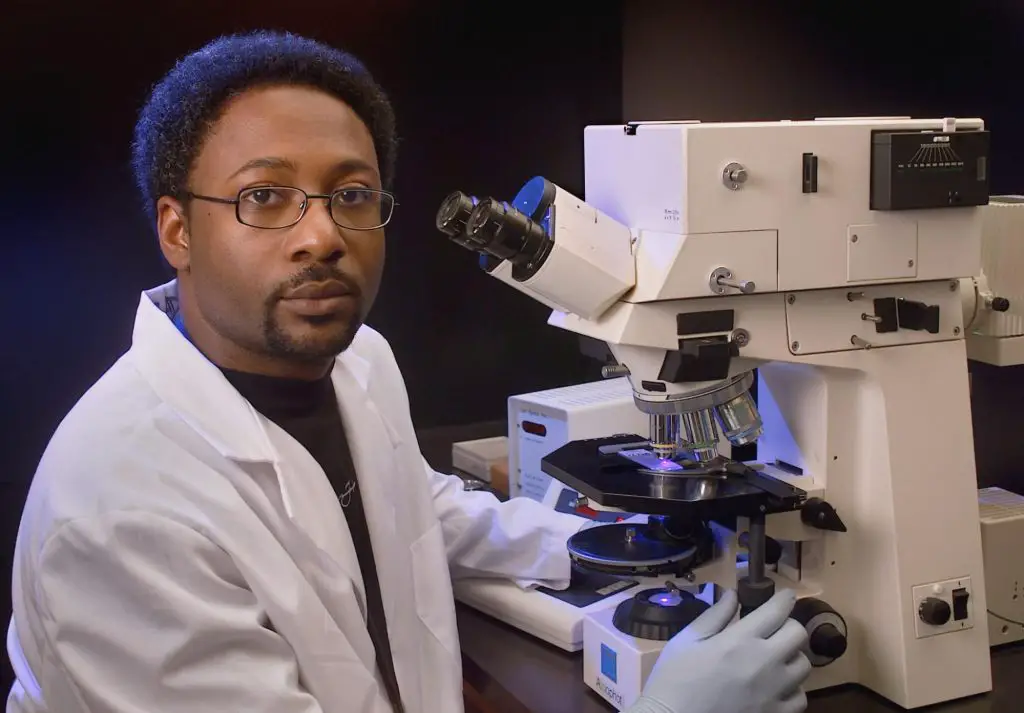
What do they do?
The role of a staff scientist involves working with highly-motivated minds to develop new products, processes, and techniques that are useful across multiple industries.
They’re responsible for helping to:
- Manage the research process.
- Analyze data and results.
- Identify patterns that may be useful to scientific progress.
- Write reports on their findings and present them to clients.
What degrees and skills are usually required?
To become a staff scientist, you need at least a bachelor’s degree in chemistry or a related field. You also need experience working in this field.
Who’s hiring for these jobs?
Staff scientists work in research labs or companies involved in scientific research. They can also find work in universities and colleges.
The average salary for these scientists is $107,494 per year, making them the highest-paid on this list.
What’s the best way to get this job?
You could also consider getting an internship at a company or a lab after graduation. This will increase your chances of finding employment. Once you get a job alert, apply with a well-written resume.
What’s it like to be a staff scientist?
Similar Articles:
- 10 Highest Paying Nursing Jobs to Consider
- 10 Highest Paying Veterinary Jobs to Consider
- 10 Highest Paying Social Science Jobs to Consider
Conclusion
These careers have a range of requirements from a bachelor’s degree to a master’s degree depending on the positions and market situation at the time.
Besides dealing with immune systems, the immunology field is popular for its diversity.
Whether you are a fresh graduate or a postdoctoral fellow who deals with in vitro studies, there is a high-paying career for you in immunology.


